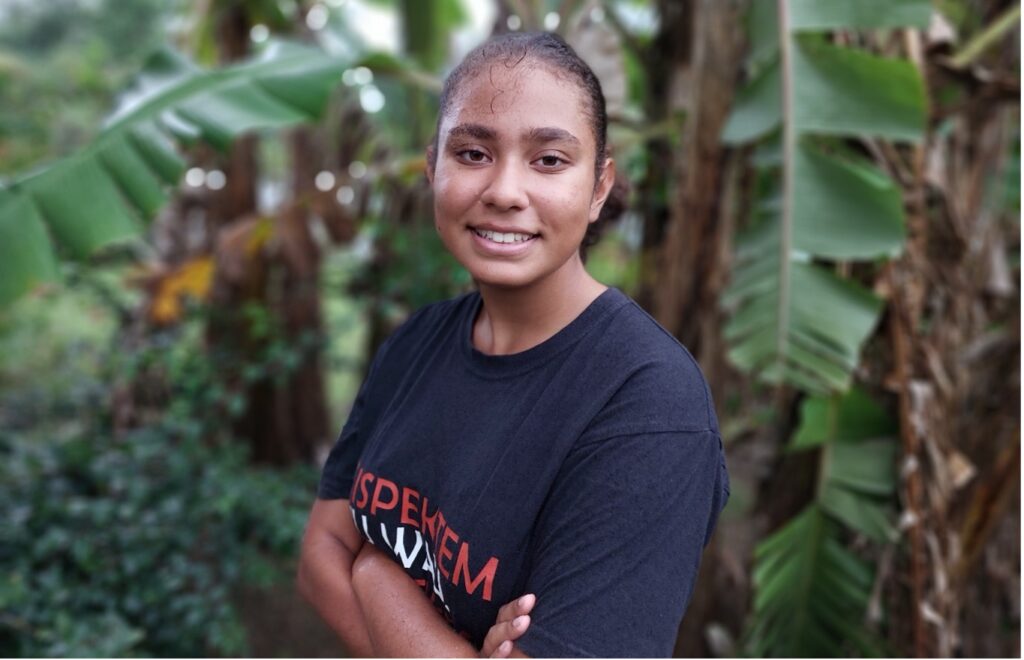Chloe (pictured above) is a 14-year-old Ni-Vanuatu girl who has experienced the devastating consequences of cyclones in Vanuatu, including a Category Five Cyclone a few weeks ago, which was the most powerful pre-cyclone season cyclone ever recorded. She shares her experiences as global leaders meet in Dubai for climate negotiations.
As world leaders meet this week in Dubai for COP28, I can’t help but wonder whether they continue to underestimate the impacts of the climate crisis on vulnerable communities, particularly children, or whether they simply just don’t care.
But perhaps it’s just a lack of exposure to the terrible reality of this unfolding catastrophe and so I want to take this opportunity to share what it’s like to live in Vanuatu, the most disaster-prone country in the world.
Living in Vanuatu means you know the next cyclone is always coming. It’s just a matter of how devastating it will be.
We don’t even have time to be afraid of cyclones anymore, we just have to prepare for them, survive them and then recover from them. We do this over and over again nearly every year. It’s just how life is here, and we can’t escape that.
The most recent cyclone was just a few weeks ago, when Tropical Cyclone Lola, the first pre-cyclone season category five cyclone to occur on record in the southern hemisphere, destroyed hundreds of homes and schools and sadly, killed two people.
The unexpectedly early beginning of this cyclone season follows a nasty end to the last, in which Vanuatu was hit by twin Category Four cyclones in March of this year, destroying homes and leaving many families terrified for their safety.
Making matters worse, we’re expecting between nine and 14 cyclones to hit the region before the cyclone season ends in April, with many of them expected to be severe, and Vanuatu expected to be hardest hit.
This is the terrifying reality for children across the 83 islands that make up the small Pacific Island nation of Vanuatu. After all, Vanuatu is one of the most disaster-prone countries in the world, and the climate crisis is only making it worse.
During the cyclones in March, we had no power and there was no way to contact family and friends, so it was hard to know if they were okay or what damage had occurred across the country. All the trees had been badly damaged, so we couldn’t find fresh food like pawpaw and bananas, which are usually a staple food.
In Vanuatu, we’re doing everything we can to come up with solutions of our own to the challenges ahead by leading climate adaptation and working together for climate justice through the International Court of Justice.
In fact, my own father is involved in this action. After witnessing the loss of livestock and crops after the March cyclones, which left many families with little to no access to food, my father began working with Save the Children to preserve food so when future cyclones strike, families aren’t left hungry.
This is important work as humanitarian aid from other countries, while surely welcomed, can take a long time to arrive, especially during or in the immediate aftermath of a cyclone.
However, even by doing everything we can with the resources we have to not only prepare for cyclones but to help prevent the climate crisis from becoming worse than it already is, Vanuatu alone cannot have a significant impact because we have a minuscule carbon footprint compared to many other countries around the world.
I therefore find it deeply unfair that Vanuatu and many other small Island nations will suffer the impacts of the climate crisis before the large, developed countries that have caused it, and there’s nothing we alone can do about it.
With the world’s biggest climate summit, COP28 underway, I am hoping to see leaders from around the world step up and commit to seriously tackling this issue, which should include further action to reduce their carbon footprints and supporting countries already suffering climate impacts.
I hope they realise that if they fail, again, to do so, the climate crisis will only get worse and, along with it, extreme weather events, such as cyclones, more severe, at the expense of my future and the futures of all children.
This opinion piece has been provided with the help of Save the Children.


